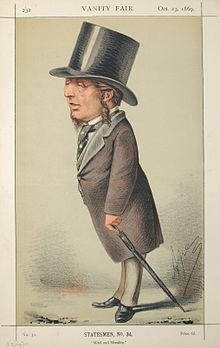Acton Smee Ayrton
|
The Right Honourable Acton Smee Ayrton |
|
|---|---|

Caricature by Ape published in Vanity Fair in 1869.
|
|
| First Commissioner of Works | |
|
In office 26 October 1869 – 11 August 1873 |
|
| Monarch | Queen Victoria |
| Prime Minister | William Ewart Gladstone |
| Preceded by | Austen Henry Layard |
| Succeeded by | William Patrick Adam |
| Personal details | |
| Born | 5 August 1816 |
| Died | 30 November 1886 (aged 70) |
| Nationality | British |
| Political party | Liberal |
Acton Smee Ayrton (5 August 1816 – 30 November 1886) was a British barrister and Liberal Party politician. Considered a radical and champion of the working classes, he served as First Commissioner of Works under William Ewart Gladstone between 1869 and 1873. He is best remembered for the "Ayrton controversy" over scientific facilities at Kew Gardens.
Ayrton was the uncle of the physicist and electrical engineer William Edward Ayrton.
Ayrton practised as a solicitor in Bombay, British India, and was called to the Bar, Middle Temple, in 1853. In 1857 he was elected Member of Parliament for Tower Hamlets, a seat he held until 1874. He held office in William Ewart Gladstone's first administration as Financial Secretary to the Treasury from 1868 to 1869 and as First Commissioner of Works from 1869 to 1873 and was sworn of the Privy Council in 1869.
Ayrton is best remembered for the so-called "Ayrton controversy". In an attempt, in the early 1870s, to reduce Government spending, Ayrton (as First Commissioner of Works) encouraged a proposal that the costly scientific functions of Kew Gardens should be transferred and that the gardens should be retained purely as a public park. This prompted a confrontation with Joseph Dalton Hooker (Director at Kew), who enlisted the support of Charles Darwin and Charles Lyell, amongst other scientific luminaries. After debates in both Houses of Parliament, Ayrton was transferred to the post of Judge Advocate General and the proposal failed.
...
Wikipedia
